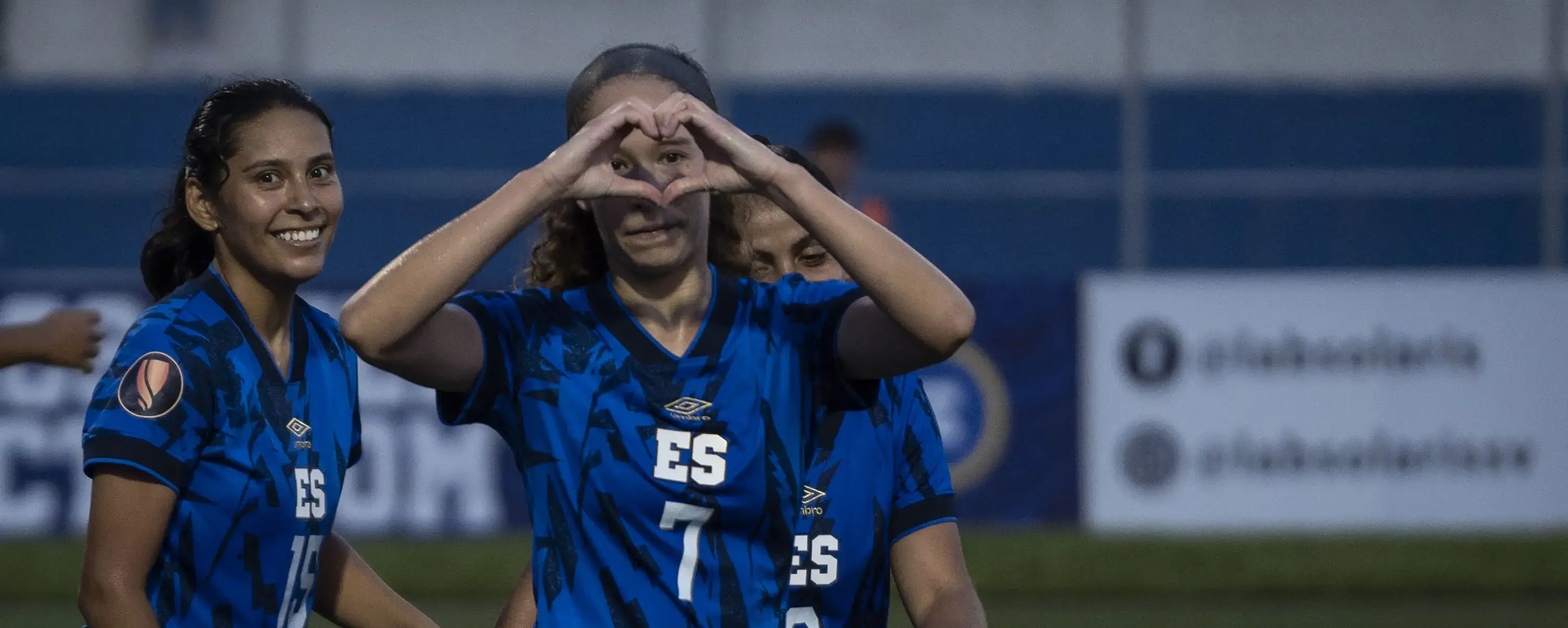
Para leer esta historia en español, haga clic aquí.
Victoria Meza controlled the ball in two touches before scoring the goal that sealed El Salvador’s historic first win against Costa Rica. She was on the attack, some 40 yards away from the goal. A Costa Rican midfielder played the ball short, pressed by Salvadoran Emely Rubio. “I controlled it and hit it. I said: let this thing go in,” Victoria recalled. She kicked it with the right and the ball made a slow and beautiful parabola, went over the diving keeper, hit the right post close to the 90, bounced once over the line, hit the left post and finally went in, to the euphoric screams of El Salvador’s bench. It’s hard to say what’s more stunning: the beauty of the shot or how easy she made it look.
“I started running and accidentally hit a Costa Rican player with the head. And I breathed.” Victoria extended her arms and then froze, like a triumphant statue, waiting for her teammates to embrace her. It was March 5, 2023. The U-19 Central American soccer tournament in Tegucigalpa, Honduras had barely kicked off.

As a nonprofit journalism organization, we depend on your support to fund more than 170 reporting projects every year on critical global and local issues. Donate any amount today to become a Pulitzer Center Champion and receive exclusive benefits!
In Victoria’s mind, the match had started long before. While training the previous week, she motivated the team by bullying: “Is that how you’re going to defend against Costa Rica?” During the game, the intensity only spiked. “Look out, kill that girl, cut her legs off!” she shouted to Emely. “And she almost did. When the ball came to me I just thought: You poor thing, you don’t know who you’re messing with right now,” Victoria said smiling.
Five years before, none of El Salvador’s starting eleven in Tegucigalpa were on the field in a World Cup qualifier against Costa Rica, played in Florida. El Salvador lost 11-0.
It was August 27, 2018. “Catastrophic Humiliation,” declared the headlines of Salvadoran media, who have otherwise blatantly ignored the women’s national team. One of the articles remembered La Selecta’s most famous soccer record: the men’s defeat against Hungary in the 1982 World Cup 10-1, the worst-ever score in the history of World Cups.
At least the men scored once.
The women’s national team coach, Eric Acuña, stresses that the squad won only 13 official games in 20 years before the recent reassembly, where Victoria plays a key role.
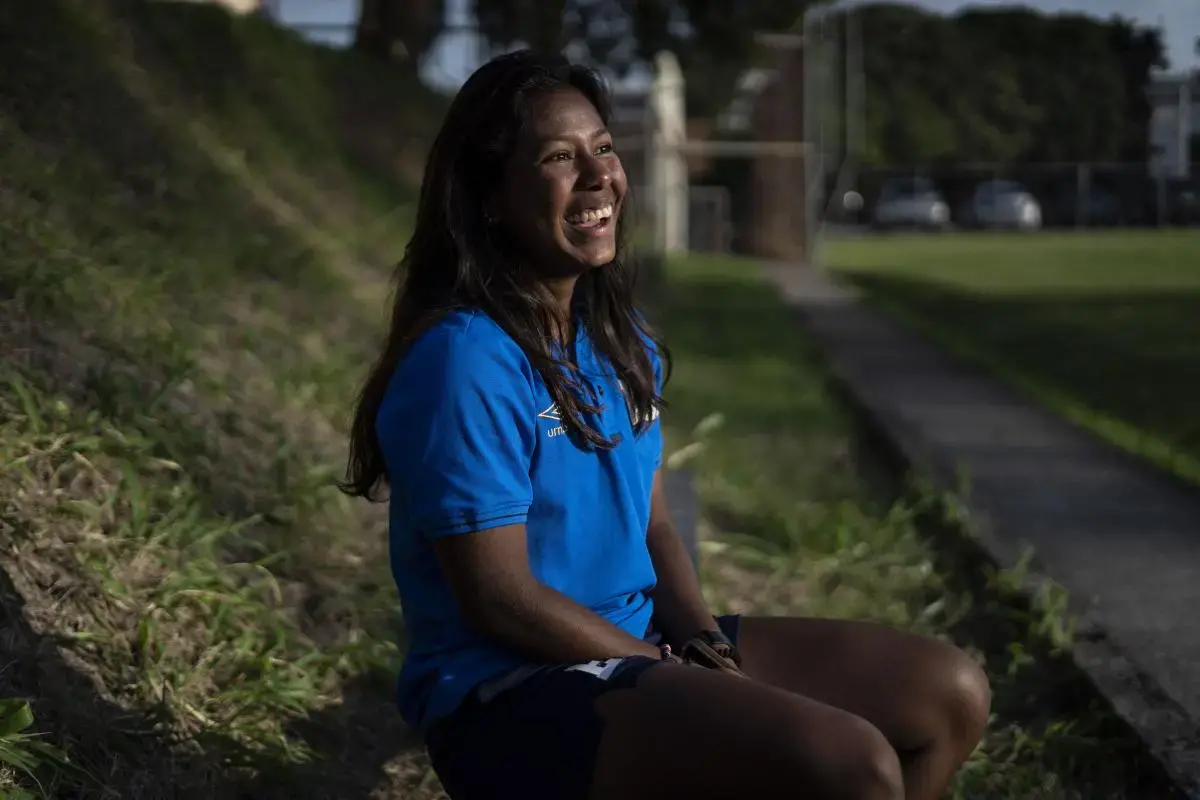
Now it sounds like a distant past. In 2023, El Salvador women’s team hit strides that the men’s soccer team has not achieved in decades: They won a Central American championship, came third in last year's Central American and Caribbean games, and went undefeated in their path to qualify for the Gold Cup, the hemisphere’s biggest tournament. Not to salt the wound, but the men haven’t won a tournament in over 20 years; since 2023 they went 21 games without a win and replaced the head coach twice. They haven’t been to the World Cup since the Hungary defeat.
The women’s turnaround is all the more remarkable considering El Salvador is not a country that makes it easy for women to win. The country ranks 17 out of 21 Latin American countries in gender equality in the Global Gender Gap Index, produced annually by the World Economic Forum. Despite a drastic reduction in homicides in the last few years, the country still holds the third-highest femicide rate in Latin America. The Salvadoran Soccer Federation (Fesfut) budgets a little above $500,000 for the whole women’s program.
Results cannot be understood without the Salvadoran-American factor. 12 players of the 20-women roster that won the Central American championship grew up in the United States, like Maryland-born Emely Rubio (19), Nacogdoches, Texas native Kelsey Villatoro (18), and Houston’s Jazzy Díaz (17).
By outperforming the men’s team, they have won media attention and the favor of part of the crowd of soccer fans eager for a winning team and suddenly gender-blind. By having such a bi-national component, they also are a fine expression of El Salvador’s enormous American diaspora, an estimated 2.5 million in the United States compared to the population of 6 million in El Salvador. They redefine what being Salvadoran is, even if some of the players don’t speak Spanish at all.
Victoria, a 19-year-old midfielder born in San Salvador, is both a pivotal player and a bridge between the two countries this team belongs to. She now lives in Texas.
The Midfield Engine
In a 5-1 defeat against Mexico, on March 8, 2022, Victoria was a solitary highlight. Down 3-0 in the second half on a muddy pitch, she received an aerial lob, slightly controlled with her right sole, let the ball fall to the left, spun off to the right, and got off a shot with her left foot. She beat a Mexican defender who was pulling her arm, a second one closing in, and the keeper who came out to narrow the angle.
Juan Pablo Sorín, a former Argentina national player turned pundit, singled out the goal on X.
Victoria started playing when she was four, at the urging of her mom, who couldn’t keep her from jumping off beds and couches. “She saw me so hyperactive that she put me in soccer to try and wear me down a little,” she said, giggling before a training session at the Fesfut facilities in San Salvador.
She joined FundaMadrid, the local program of world powerhouse Real Madrid. Except, they didn’t have a girls' program. “My brother was playing there. I used to run around like crazy on the sidelines and my mom asked the coach if he would let me play before someone would scold me,” Victoria said. It was 2019 and girls were rare in soccer academies of El Salvador.
“I had to hold my ground or they would break my legs,” she said of the boys she played with. “At 14, they were much stronger and, honestly, better than me. I had to compete with them. And it helped me a lot.”
Her story resonates with many women footballers. El Salvador’s women’s league was established in 2016, more as a soccer federation requirement for a club license than out of a real interest. It’s a worldwide trend: Real Madrid, arguably the world’s most famous club, only created its women’s team in 2020. The Female Ballon d’Or, the France-based prize for the best player, had its first edition in 2018, more than 60 years after handing out the men’s trophy in 1956. Women’s soccer is undoubtedly popular in the U.S., but the rest of the world is just catching up.
Victoria went on to debut with El Salvador’s women’s team when she was 16, honoring a family tradition. Her uncle, Mario Mayén Meza, played 36 games for El Salvador in the 90’s. He was nicknamed “The Shark.” Victoria drew inspiration from that when she became a midfielder, after getting her first break as a forward. “I like the idea of destroying in the field. I had to learn to read the game, make quick decisions, read the players’ hips,” she said.
She does far more than destroy. “She's really exceptional in the air,” said Steve Holman, her coach at Texas State University, where Victoria has secured a starting role as a freshman. “But I think the one thing that she brings that very few players have is her ability to hit that final pass, to clip a ball in behind the opposing backline. She's a midfielder that makes our forwards better because of her ability to play them in with that pass,” Holman told me after a home game defeat in San Marcos. She fitted seamlessly into her rookie year at Texas State. The team set a season record for assists. Victoria contributed with four assists, three goals and led the team in shots on goal.
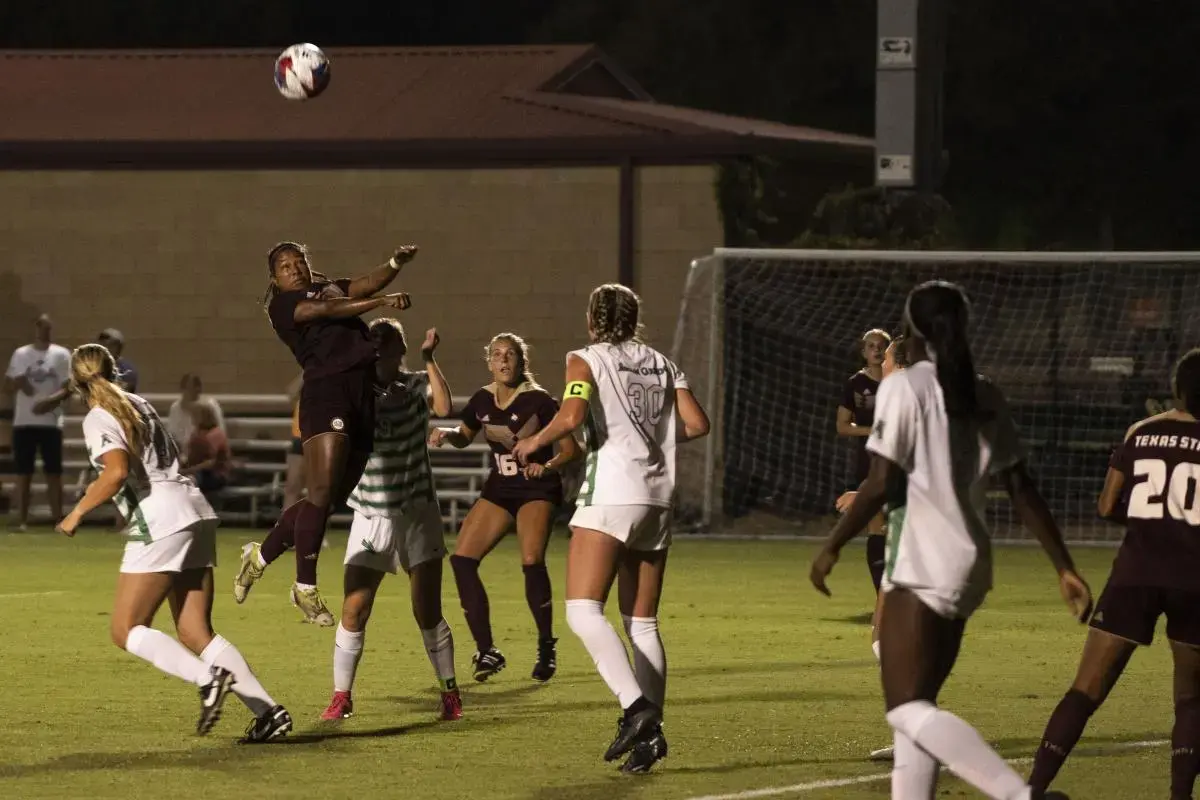
That aerial quality was decisive in July 2023, when a header from Victoria gave El Salvador the bronze in the Central American and Caribbean games against Guatemala. She ducked to meet the ball almost on the penalty spot and turned her neck, violently but gracefully, to send the ball to the bottom left corner, just out of reach of the Guatemalan keeper.
After scoring, she embraced teammate Juana Plata. Juana was key for Victoria to be able to study and play in Division 1 (D-1) of the National Collegiate Athletic Association, the highest-profile league of college sports in America.
Juana credits father's tough coaching style
Left-back Juana Plata practices crosses maybe more than anything else. It’s her key move. With the help of a plastic rebounder wall, when the practice session is done for the rest of the team she crosses the ball over and over again toward the goal area on an empty field. At dawn, the Texas sun is still more of a warm toy oven, but by 10 a.m. in the summer, it becomes a furnace.
Juana said she imagined Victoria, or 4’11” football wonder Brenda Cerén, or Los Angeles-born Danya Gutiérrez, on the receiving end while training on her own in San Marcos, a college town of around 67,000 people some 180 miles west from Houston, her hometown.
One morning last summer, I was there when she carried a bag of balls and laid them out on the field. She set up her small blue cones for dribbling exercises, tied her boots on the bench, the left one first, and said she dreamt of scoring a goal for El Salvador, which she has yet to accomplish despite being a starter since 2021.
Juana Plata started playing at the old age of 12 when she asked her father for cleats as a birthday gift. “I was really bad at first and then, after games, he would make me stay and say, ‘We're gonna kick the ball until your shot and touch are perfect,’” she told me. “I had to work a lot harder than people who've been playing since they were three or four years old, but I just did, hard enough to be able to get it done.”
Her Mexican father’s severe methods scared away five younger siblings from practice. “I think they just saw how hard my dad was on me and they were like, ‘No, I don't want to get yelled at.’”
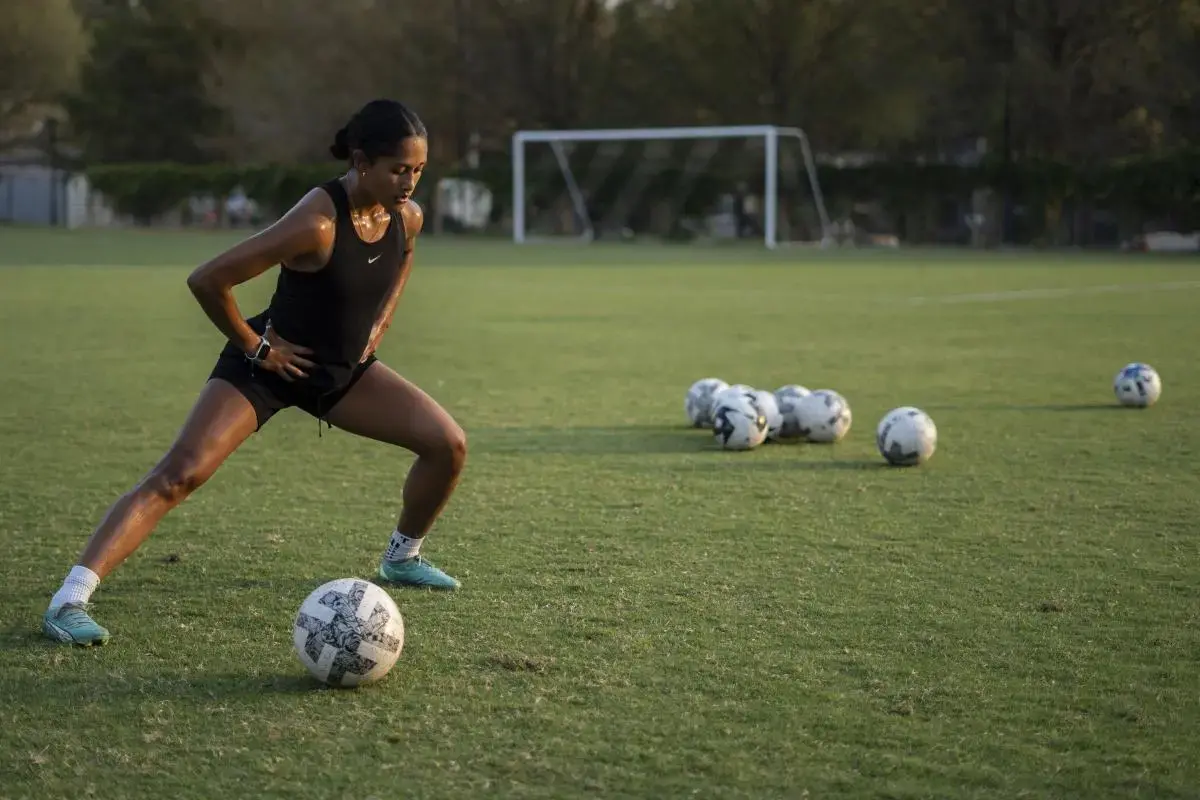
Juana comes from a blue-collar family: Her father works in construction and her Salvadoran mother is an accountant. “My parents were well-off but putting all six kids through college would be expensive. As soon as I found out people get their school paid for just playing on a team, I said: ‘Yeah, let's do it. Sign me up.’” Lamar University, in Beaumont, Texas, offered her that kind of deal. Mr. Holman was the coach there. When he signed with Texas State, he took Juana with him. That also put her in the position to advise them on signing Victoria.
Victoria had sent her highlight reel to the coaches. They asked Juana before traveling to see her. “They were like, ‘Oh my God, she's amazing. We need her, make her come here.’ So I talked to Victoria. I said: ‘Look, this is a great campus. It's a great education. The team's good. The coaches are amazing and coaches [in other places] are not always good,’” Juana explained.
* * *
From the air, Texas looks like a quilt of soccer, baseball, and football fields. Once down on the road, it becomes apparent why they call it The Great Plains. The long, straight roads seem fit for a plane to land. A truck full of watermelons, an oil museum, cows, a road-killed raccoon, a billboard for machine gun rentals, the chain of the friendly beaver Buc-ee’s, and a suspicious sound of a rattle when we stop on the road to take some photos.
Soccer is deeply ingrained in the college culture, but the crowd at a Texas State home game seems much more mild than in Central America. The home crowd sang “You can’t do that” to the opposition North Texas, nicknamed the “Mean Green.” For banter, a rival fan shouted “Get in the weight room” to a Texas State player. During half-time, four guys in flip-flops and a woman raced through cones, tried to score into a small goal, and ran back to the starting line for entertainment.
It’s quite different from the Cuscatlán stadium, home of La Selecta, where the cheapest seats are nicknamed “Vietnam” for the hostility toward visiting teams. Local fans even rage and throw water and other liquids against any Selecta supporter who dares enter the area not wearing El Salvador’s white or blue. FIFA has punished Mexico for homophobic chants; if they paid attention to the Vietnam chants, the stadium could be banned for life.
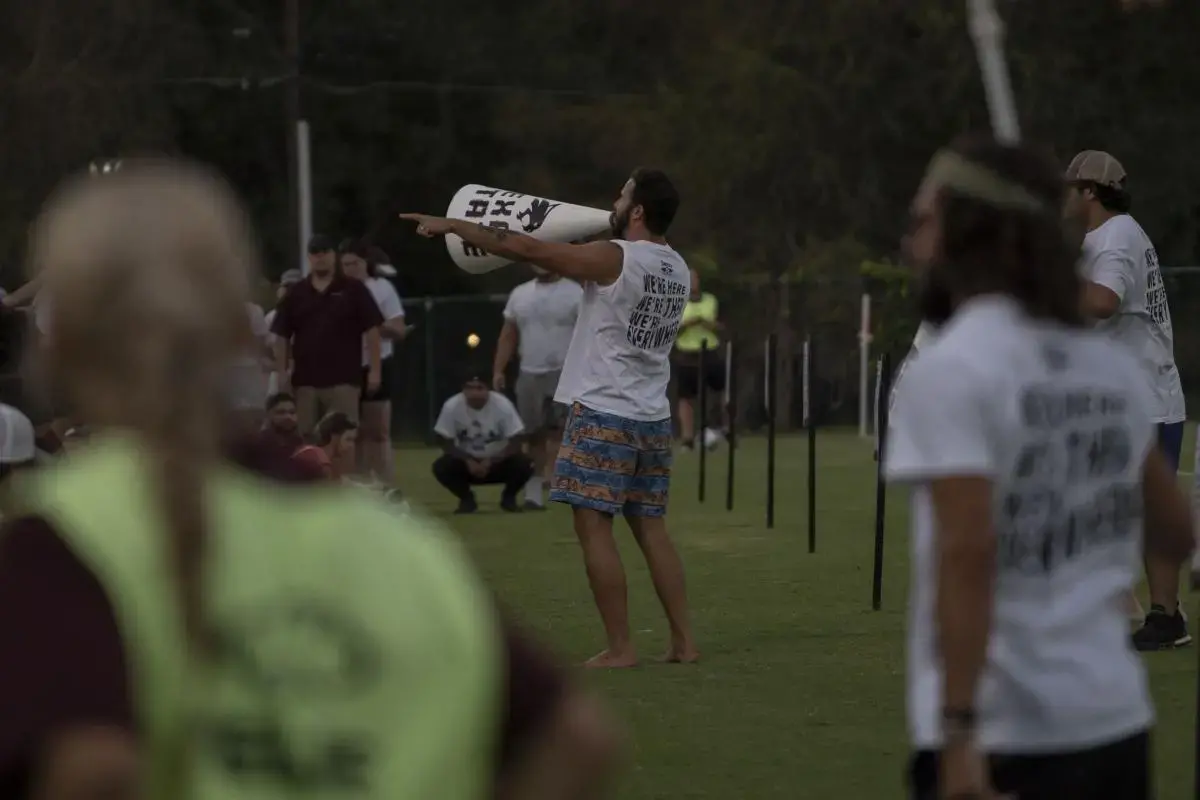
El Salvador’s professional soccer is chaotic and deficient. Teams regularly get behind in paying salaries. Saying league players are undisciplined would be underplaying it, with 14 of them banned for life for match-fixing. National team defender Lizandro Claros was arrested for a DUI last March 16 but seven days later he started the game his team, Municipal Limeño, won 4-2 against Santa Tecla.
Juana grew up at a distance from that. Though she had visited El Salvador, she is closer to the Mexican side of her family. But deciding to play for her mother’s country was a quick yes. El Salvador approached her. Mexico did not. And she was never really on the U.S. radar. “If you play for a big club, you get seen by big coaches, but I didn't play for big clubs because it cost a lot of money,” she explained.
Even so, she realizes she enjoys certain privileges compared to other Salvadoran team players. “There are maybe ten good fields just ten minutes from my house,” said Juana. “That’s one of the reasons why I have done really well and other Americans have been pretty successful, just because sometimes we have more resources. My teammates have mentioned they have to drive maybe an hour just to get to training or, if they have a field by their house, it's not the best. They don't have all these balls and cones.”
To Juana’s chagrin, the national team trains on turf, not grass. Nor do they get to keep their jerseys to swap them with the other team after games, as is customary in soccer.
Why did she want to join a small program, not particularly known for winning? “My family who lives over there didn't know there was a national team,” she said. “I found an article that had past games and saw: Loss, Loss, Loss. I said: ‘Oh, my gosh, this is crazy.’” But Juana understood one thing the first time she played in front of a Salvadoran crowd: “It was really rewarding seeing these people, my mom's people, and playing for something bigger than ourselves.”
Juana smiles easily. “Not everyone is photogenic,” she joked after I caught her fixing her hair for the third time before shooting an interview. She wore her hair on a clip, baggy jeans and a black top with a tote bag. She said she didn’t want to be portrayed only as a soccer player — she earned her MBA last December.
Juana never imagined a career in soccer but last January she signed for Monterrey, in Liga MX, the Mexican First Division. No male Salvadoran players have played in the Liga MX since the 90s, and Juana is one of four from the Women’s Selecta who currently do. Brenda Cerén plays for Atlas, in Guadalajara, while Danielle Fuentes and Karen Reyes play for Necaxa, in Aguascalientes.
While she was growing up, the career path seemed exclusive to men. “There was never a voice to represent me. I didn't have anyone to look up to as a woman soccer player.” Now, she wants to be just that. “I see it as an opportunity to do something that I didn't have and represent young girls that come from similar backgrounds, similar demographics.”
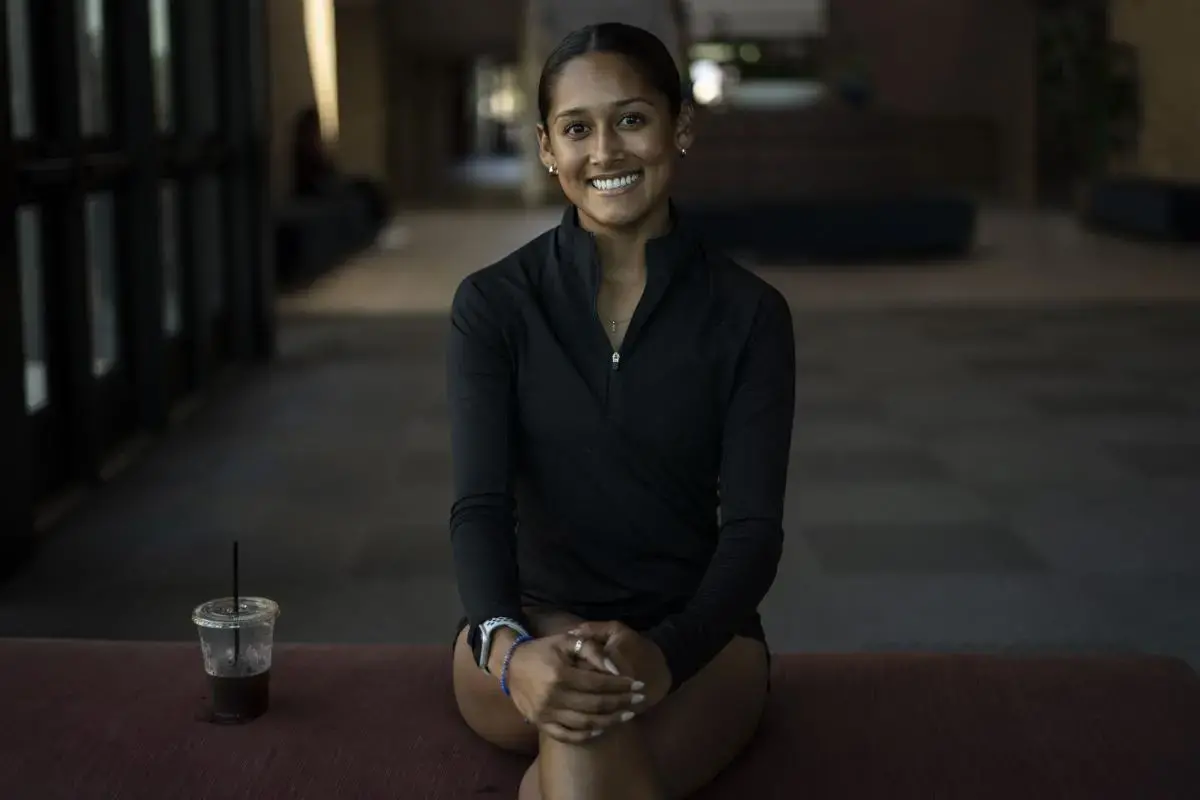
“We're a lot tougher than y’all think,” she said.
The Number 13
Eric Acuña started a recruiting program as soon as he was hired to coach the Salvadoran women’s team in 2020. “It’s self-managed,” he told me. “I’m my own sports director. I travel to Houston, Dallas, and Los Angeles. The federation only pays for my plane tickets,” he said.
The locations are not casual. Salvadorans are the third-largest Hispanic minority in the U.S., with Los Angeles as the first massive hub. From there, large communities expand through the Bay Area, Texas, and the Washington, D.C. area. The numbers increased with the arrival of civil war refugees in the 80s, but the flow has never stopped. Just last year, around 60,000 Salvadorans were detained at the U.S. southern border. The pool of U.S.-born players that the national teams can pick is a testament to this reality.
The recruiting trend was inevitable. The men’s team did it in 2021. A third of the roster that competed in the 2022 men’s World Cup qualifiers was not born in El Salvador, hailing mostly from California. The team added MLS players Eriq Zavaleta and Alex Roldán, brother of U.S. team midfielder Cristian Roldán. The share of Salvadoran Americans on the women’s team doubles that of the men.
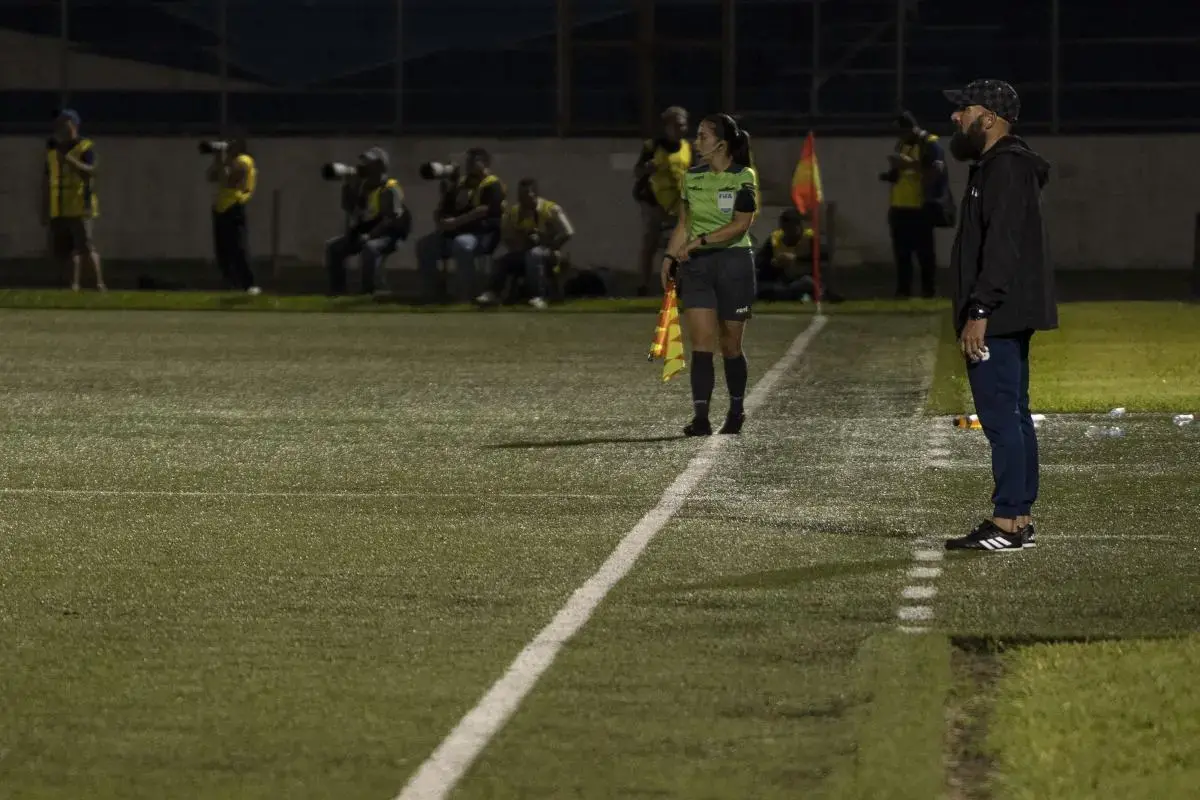
Center-back Reina Cruz ended up in Houston at age 13 because in Santa Ana her family was threatened by the notorious MS-13 gang.
“No one is ready to leave their country. But the violence, the gangs, were like a plague in our country. My family was a target just because they were aware that we had someone in the United States,” Reina told me. That someone was her father, a farmer who moved to Texas years before with a work permit to support his wife and five kids. “My brothers and I weren’t safe anymore. We got threatened we would be kidnapped and that pushed us to move out of the country,” she said.
Unlike her U.S.-born teammates, Reina spent her childhood in Río Zarco, a community north of Santa Ana, near the border with Guatemala. Once in the United States, as a middle schooler with a language barrier, she turned to soccer as a way to close the cultural gap.
“You had to work your way around without stepping on anyone's toes,” she said. “When I was transitioning to high school, a coach asked me what I would like to do as an after-school activity. I went for soccer right away.” Reina hoped it was the same sport that she was used to playing in the streets of Santa Ana, but she found herself in a far more competitive atmosphere, surrounded by girls who had been training and playing on formal teams for nearly a decade.
“It didn't discourage me,” she said. “If we survived violence and gangs in our country, learning organized soccer was the least of my concerns.”
Learn she did. Her living room is adorned with the 2016 and 2019 Defensive Player of the Year award from Prairie View A&M University. She got recruited because a scout saw her in a game where she scored a hat trick despite being a defender. Once she left college she kept playing Sunday League in Houston. There, someone told her she should try out for the Salvadoran national team, and that’s how she found out El Salvador had a women’s team. “I never watched them play. I never saw anything on TV. I had no idea that El Salvador competed against other countries until I moved back to Houston,” Reina said.

She set the goal, but it wasn’t a straight shot. Having been abroad for 10 years, she had no contacts in El Salvador. She hadn’t even considered moving back: “I didn't think I would ever get the chance to go back and be safe.” A Houston coach called her for a tryout in 2021. She debuted in a friendly against Honduras in November that year.
Reina wore number 21 on her first match for El Salvador. But it wasn’t her preferred jersey. In her home pictures, she wears the 13, which also happens to be the signature of the gang that forced her to flee the country. “Unlucky number. No one wants it? I want it. I will show you that 13 doesn't mean anything,” Reina said.
Playing in the Sunday League earned her more than a spot on the national team. That’s also where she met Megan Bennett, her girlfriend since 2021. An American with Korean heritage, Megan started training in the El Salvador team camp in September 2023, two years after Reina joined La Selecta. Coach Acuña said they were interested in Megan, who is also a center-back, and said the federation would be starting the paperwork to get her a Salvadoran passport.
While there are a number of ways to get a Salvadoran ID, Reina said one of the ideas is for them to marry so Megan can become Salvadoran through Reina. But El Salvador does not recognize same-sex marriage. It’s just another one of the ways how members of the team are challenging the status quo. It is the first time the country has a top athlete who is openly gay.
An employee at El Salvador’s consulate in Houston said that no Salvadoran law allows the validation of same-sex marriages in the country. That’s not the only way, though. On the men’s team, there are numerous cases of granting nationality for sports interests. In 1997 El Salvador played the World Cup Qualifiers with two Brazilian forwards: Nidelson Silva “Nenei” and Israel Castro, and a Yugoslavian center-back, Vladan Vicevic. As recently as 2022, Michel Mercado, a Colombian striker, bid his case with the Legislative Assembly to play for La Selecta. It has yet to be seen if there is political will to do the same for the women’s team.
Unlike the U.S. Women’s national team, which is heavily invested in achieving equal payment and championing LGBT rights, the Salvadoran squad has not been vocal about that agenda. Reina seems to shy away from public debate. “I don’t want to be the face of that. I don’t wake up with a rainbow on my forehead. I don’t tell the ball I’m lesbian so I can control it. I want to be successful. You don’t need to worry about what I do behind closed doors,” she said.
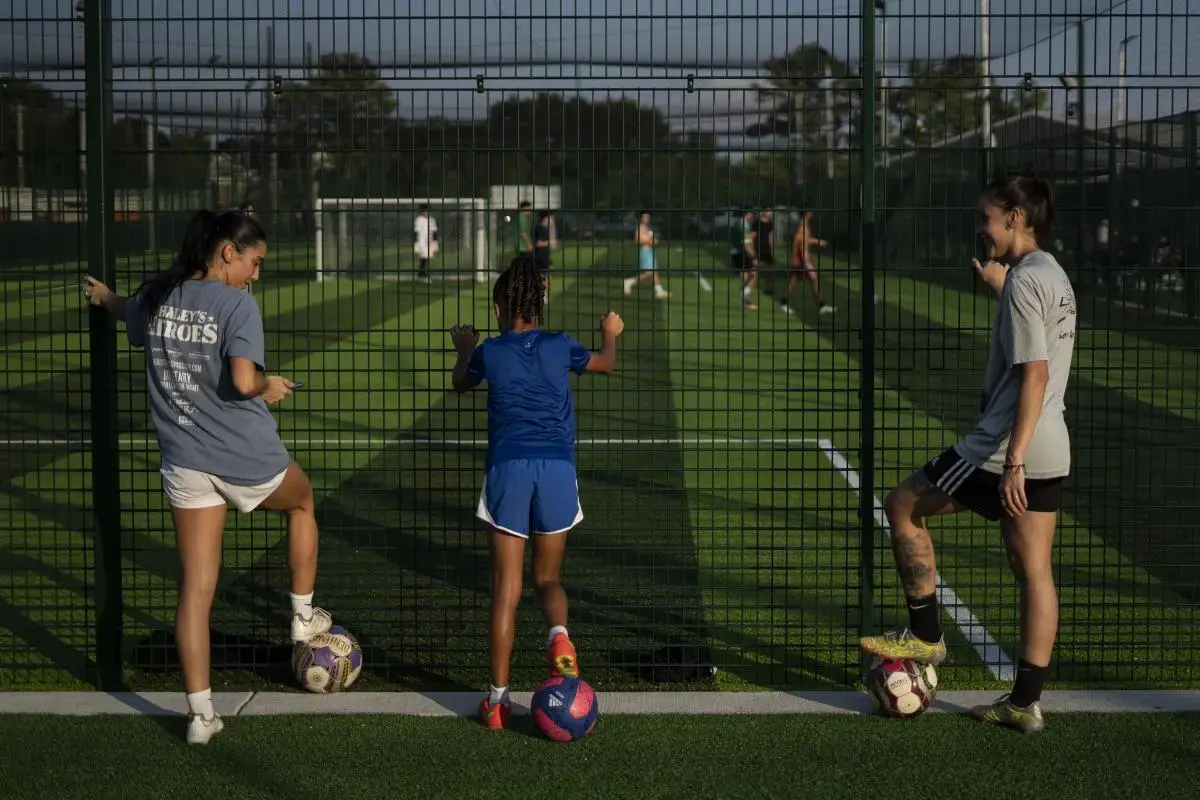
She does weigh in, though, on the support they should receive from men, both in society and in the federation. Reina also had a question for the male players of El Salvador: “We represent the same country, but they don't care about us. Have you ever seen one of them watch us play?”
Kelsey, the Louisiana Underdog
In the 50th minute of the Central American tournament final against Panama, a lobbed ball came from a right corner kick for El Salvador. The ball cleared two Panamanian players guarding the left-hand post, where Salvadoran forward Kelsey Villatoro headed it after dodging her mark. The goal set up a temporary 3-1 lead. The feat was even more remarkable because Kelsey is 5’3.
“We would end any practice training headers,” Kelsey told me. “If you didn't get a touch on the ball, [coach Acuña] wasn't gonna be very happy. Even if you missed, he never wanted a corner kick that doesn’t touch anyone.”
18-year-old Kelsey played her freshman season at Nicholls State University, in Thibodaux, Louisiana. Thibodaux is a college town an hour away from New Orleans, the entry road surrounded by swamps and littered with alligator roadkill run over by 18-wheelers or smaller trucks. It has an old-fashioned downtown, with a court, town square, and very little to see. Yet, it houses D-1 soccer, which is how Kelsey ended up here. She was born and raised in Nacogdoches, in East Texas. She speaks very little Spanish and her Salvadoran connection is recent. “If I had never played for the national team, I would have never visited El Salvador,” she said.
The fourth of seven siblings, Kelsey grew up playing with boys until the age of 11. She started to take soccer more seriously when she considered college opportunities and realized that competition was rough. “I was really scared of not going to D-1. I knew I was capable of it because of the way I was performing, but when I would message coaches they would say: ‘Oh, what club do you play for?’”
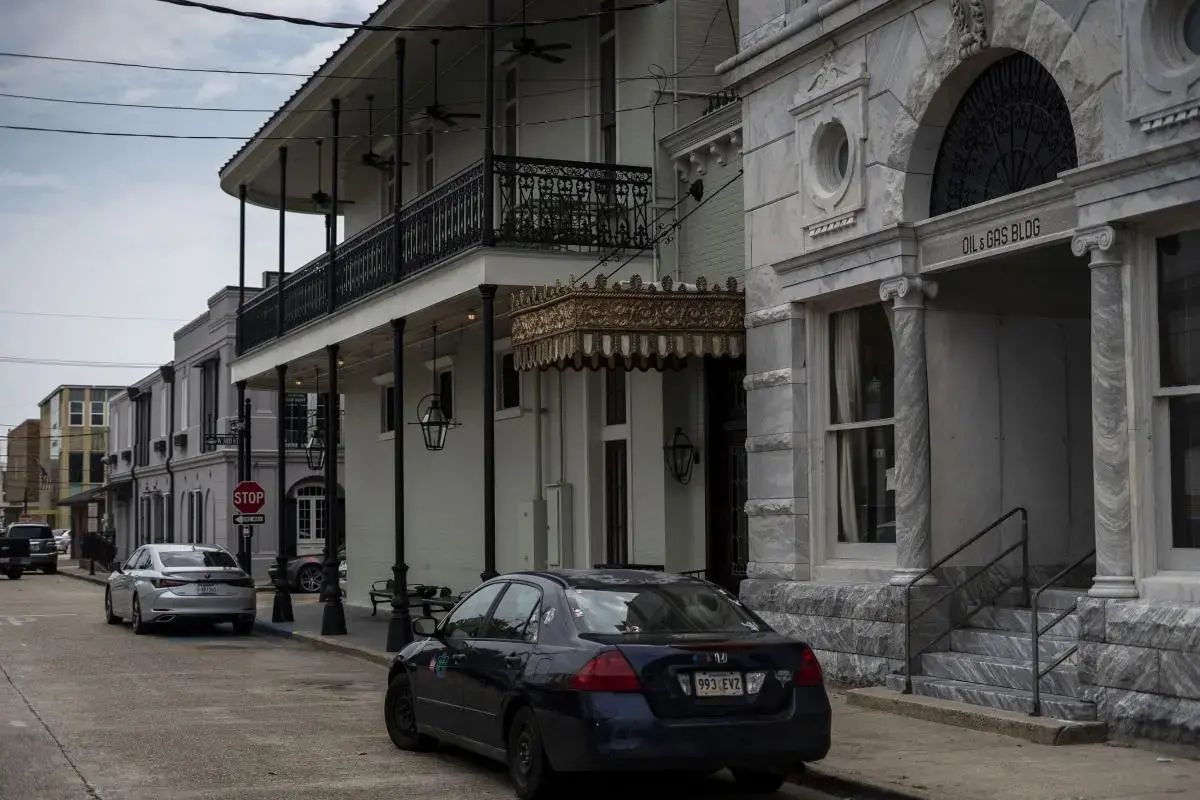
The U.S. recruiting system is built like a pyramid. At the base are the amateur neighborhood teams. Then there are more organized teams that play in regional tournaments or even travel across state borders. At the top is the Elite Clubs National League (ECNL). The higher in the pyramid, the more chances a college recruiter will see a player and offer a scholarship.
But being seen takes money: not only to pay for the membership of a club, but also for training and traveling. And it’s not just the athlete: Most often the parents have to invest time and resources to travel with them, including plane tickets and accommodation and meals. As a parent of a Salvadoran player told me: “The system is money.”
Recruiters told Kelsey: “We need to see you in person. Clubs go to these big tournaments I didn't have access to. I know a lot of people who are pretty good at soccer but they just didn’t have the ability to play club,” she said.
Things started to change when she joined the El Salvador national team. Her older brother contacted the keeper’s coach Fidel Mondragón and she sent a reel. After getting a passport, she tried out in 2022 for the Under-20 team. The 2023 tournament was Kelsey’s first experience with El Salvador.
Upon arrival, she saw things like a foreigner. She had a fresh coconut for the first time. The weather struck her as humid. She noticed how meticulously people took care of their uniforms. “I feel people are more hard-working. I don’t want to come back [to live] or anything, but I liked El Salvador,” she said.
Kelsey’s story underlines just how unlikely this team is. Rosa, her mom, is a Spanish teacher, originally from Santa Rosa de Lima, a small Salvadoran town near the border with Honduras. Her mom hadn’t gone back to the country in decades and her Spanish hiccups a little after so many years. Soccer has been a way for both to revive their Salvadoran heritage.
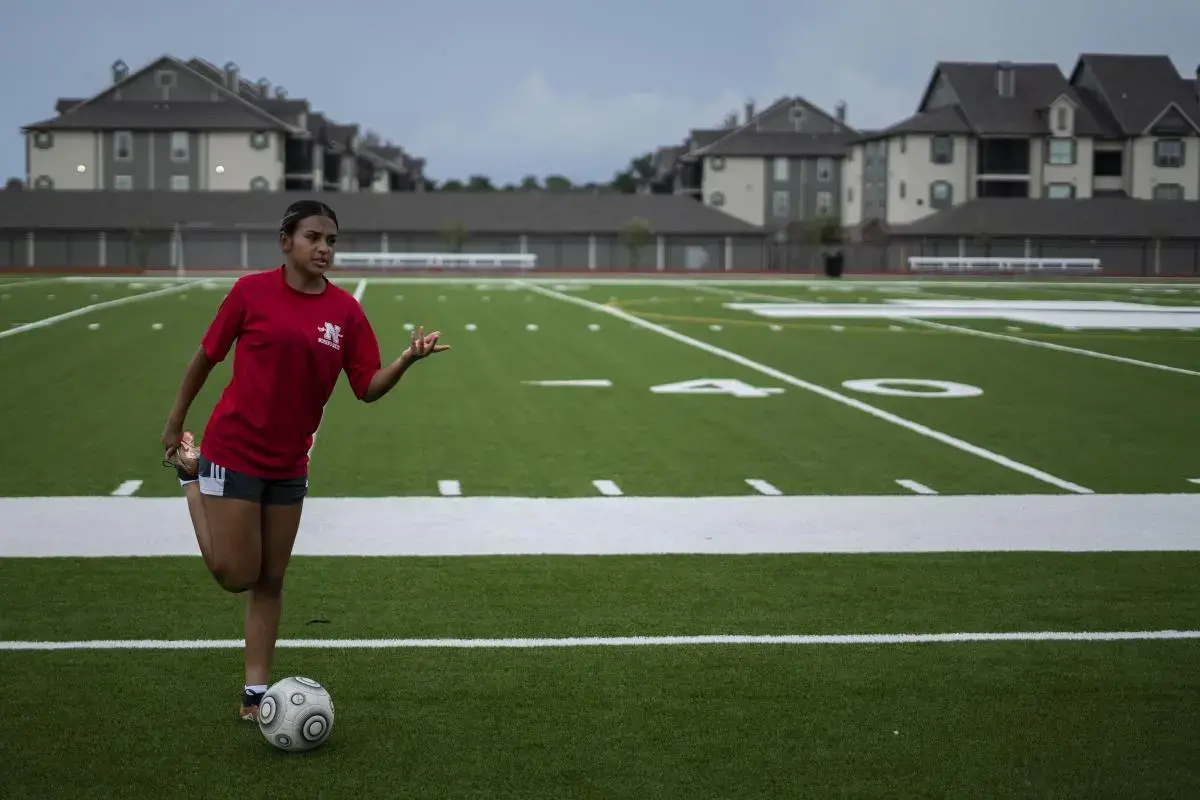
But crucially, her national team experience allowed her to bypass the system and get better college offers, despite not having a club background. After her Louisiana stint, she received six transfer offers from D-1 universities.
I asked Kelsey what she would say to the men’s team. Her answer was bright, bold, and simple: “You could win games, too.”
* * *
With nine minutes left in the final against Panama, El Salvador held a two-goal lead. But it wouldn’t be that easy. Defender Linda Guillén fouled a Panamanian player and the referee called a penalty. 2-3.
Victoria, the captain, recalls that they were all exhausted by that point. Panama equalized with four minutes to go, from a corner kick. “We knew it was straight to penalty kicks. I honestly think they would’ve beaten us if we had played overtime,” Victoria told me.
Still, Coach Acuña had one more trick up his sleeve. Before the penalties, he pulled goalkeeper Andrea Dada and introduced Nicole Valenzuela. Changing the keeper mid-game is a weird move in soccer, usually only due to injuries. But it has precedents. Famously, in the 2014 men’s World Cup, the Netherlands introduced keeper Tim Krul in the 119th minute and he went on to save two penalties against Costa Rica to move forward to the semifinals. The decision was praised as a masterstroke, but few if any have since taken the risk or equaled its success.
Ten years later, El Salvador did. Valenzuela is a specialist. “She is constantly betting: ‘A Starbucks [coffee] you won’t score,’” Victoria said. In the shootout against Panama, she saved two penalties. She had pulled off a Tim Krul.
When Andrea Recinos scored the winning goal, she hugged two teammates before being summoned to the bench with the rest of the squad. They were all kneeling and praying. “We were all crying tears of joy and relief. It was over. It was the first-ever tournament we had won!” Victoria said.
After praying, they jumped into shouting, running. They chased down Coach Acuña with a cooler. Victoria, who lifted the trophy, made sure to congratulate each teammate one by one before they went on to pick their medals.
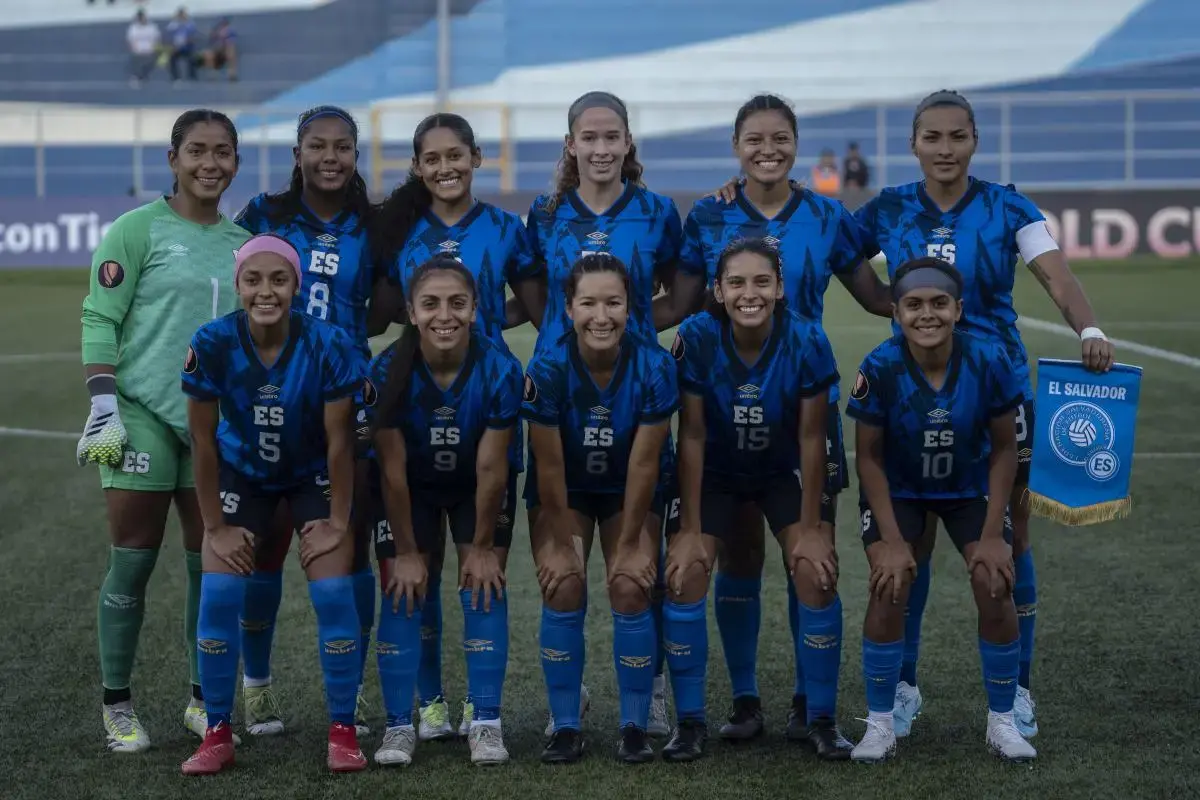
“I believe women’s soccer is changing in El Salvador,” Victoria said. “People are starting to notice or say, ‘Watch out for El Salvador.’ Or they study our games. There’s more competition and more value to playing for the national team.”
Two more players from the elite U.S. level joined Victoria on the El Salvador squad at the beginning of 2024. Samantha Fisher played for the Chicago Red Stars in the NWSL, the top club level in a country whose women’s national team has won the World Cup four times. Fisher scored El Salvador’s first goal at the Gold Cup. Bella Recinos, who had been called up to train with U.S. national youth teams, also made the Salvadoran squad for the Gold Cup.
45 years after the men last participated, the women aim to qualify for the 2027 World Cup.
- View this story on Univision Noticias











